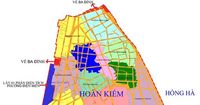In a significant administrative shift, Vietnam's Central Executive Committee has approved a merger that will reduce the number of provincial-level administrative units from 63 to 34, comprising 28 provinces and 6 centrally-run cities. This change has raised questions among citizens regarding the need to update their official documents, particularly passports, following the merger.
According to Clause 1, Article 21 of Resolution 35/2023/UBTVQH15, any documents issued before this administrative restructuring will remain valid as long as they have not expired. Furthermore, Article 10 of Resolution 190/2025/QH15 clarifies that documents issued by competent authorities prior to the reorganization will continue to be applicable until they expire or are officially amended or revoked. This means that Vietnamese citizens will not need to obtain new passports after the provinces and cities are merged.
In addition to concerns about passport validity, many are also wondering about the implications for national identity cards. As the government has announced its plans to merge several provinces and cities, citizens are advised that similar rules apply to identity cards as well, allowing them to retain their existing documents.
For those looking to apply for a new passport, the process has become more accessible. From January 1, 2024, to December 31, 2025, the fee for online passport applications will be reduced by 10% compared to previous rates. After this period, the fees will revert to their original levels.
The online passport application process has been streamlined, making it easier for citizens to navigate. Here’s a step-by-step guide to applying for a passport online:
1. Visit the Ministry of Public Security's Public Service Portal at dichvucong.bocongan.gov.vn and click on the "Login" button at the top right corner.
2. Log in using your VNeID account.
3. On the homepage, enter "passport" in the search bar and select the service for issuing ordinary passports within the country.
4. Choose the appropriate processing agency based on your circumstances (over or under 14 years old) and click "Agree" to proceed.
5. Fill in the required information, upload a 4x6 cm portrait photo with a white background, and select the option for postal delivery of your passport.
6. After completing the application, you will receive a corresponding application code. To track your application status, click on the "Track Application" menu or visit this link and enter your application code.
After submitting your application, it is advisable to check the processing status and pay the fee through banking apps or e-wallets to expedite the online passport issuance process.
Meanwhile, in Hoan Kiem District, the local government has initiated a plan to gather public opinions regarding the arrangement of administrative units. The proposal includes the establishment of two basic administrative units: the Hoan Kiem unit, covering an area of 1.93 km² with a population of 71,280, and the Cua Nam unit, which spans 1.65 km² and serves a population of 65,667.
The Hoan Kiem unit will encompass the entire area and population of several wards, including Hang Ma, Hang Bo, Hang Dao, Hang Bac, Hang Buom, Hang Gai, and Ly Thai To, while also including parts of Dong Xuan, Trang Tien, and other adjacent wards. The Cua Nam unit will consist of the whole area and population of wards like Tran Hung Dao, Hang Bai, and Phan Chu Trinh, along with portions of other wards.
In a move to ensure transparency and public involvement, the Hoan Kiem District People's Committee has directed local wards to form groups to collect opinions from residents about the proposed administrative changes. This grassroots approach is aimed at fostering community engagement in the decision-making process. The deadline for gathering public feedback is set for April 19, 2025.
The administrative changes come amid broader efforts by the Vietnamese government to enhance governance and improve public service delivery. By reducing the number of administrative units, officials hope to streamline operations and allocate resources more effectively. This restructuring is seen as a critical step in modernizing Vietnam's administrative framework and improving the efficiency of government services.
As citizens navigate these changes, the government emphasizes that existing documents will remain valid, alleviating concerns about the need for immediate updates to passports or identity cards. The focus remains on ensuring a smooth transition as the country adapts to its new administrative landscape.
In conclusion, as Vietnam moves forward with its administrative restructuring, citizens can rest assured that their current passports and identity cards will remain valid. The government’s efforts to simplify the passport application process and actively engage the public in discussions about local administrative changes reflect a commitment to transparency and effective governance.




